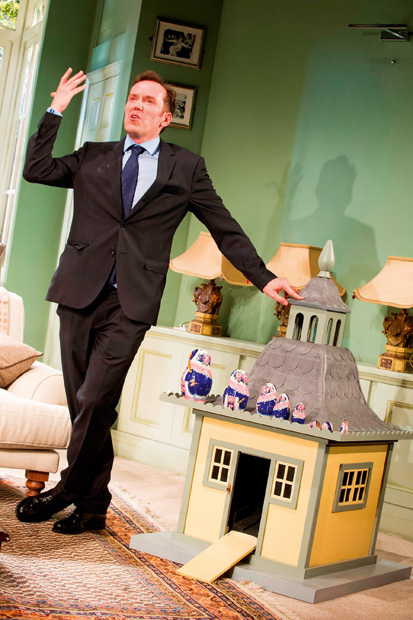It’s taken me a few months to catch up with the political farce The Duck House. Then again, it’s taken The Duck House a few years to catch up with the expenses scandal that it mocks. The story is set in the half-forgotten era of 2009. Robert Houston, a glib New Labour high-flier, is planning to defect to the Conservatives on the eve of the general election. His scheme, which is a little hard to decipher, is to stand for the Tories in his safe Labour seat and to persuade his Labour supporters to join him in a mass conversion to Conservatism.
Having pulled off this piece of electoral magic, he expects to land a plum job in the cabinet as soon as Cameron is returned to power. To make things even more improbable he has a left-wing son, Seb, whose anti-capitalist outlook makes him the ideal candidate to expose Robert’s conspiracy. But the plot obliges the son to take the father’s side, so Seb is drawn as a problem gambler who has thousands of pounds staked on illegal cock fights in the Far East. This hardly squares with the traditional profile of youthful anarchy. But then nothing in this play conforms to political logic. And it doesn’t matter a damn. So overwhelming is one’s desire to see the corruption of parliament exposed to ridicule that the opening absurdities of the script seem entirely forgiveable.
The staging is crisp and nimble. And the gags come thick and fast. Every act of villainy and peculation is duly checked off and satirised: moats, wisteria, hanging baskets, restaurant receipts, glittery loo seats, Gordon’s Brown’s cleaning bill. When Robert learns that his ditzy wife has taken delivery of a duck house he has to caper around the sitting-room in a frantic effort to conceal the poultry refuge from his new Conservative handlers.









Comments
Join the debate for just £1 a month
Be part of the conversation with other Spectator readers by getting your first three months for £3.
UNLOCK ACCESS Just £1 a monthAlready a subscriber? Log in